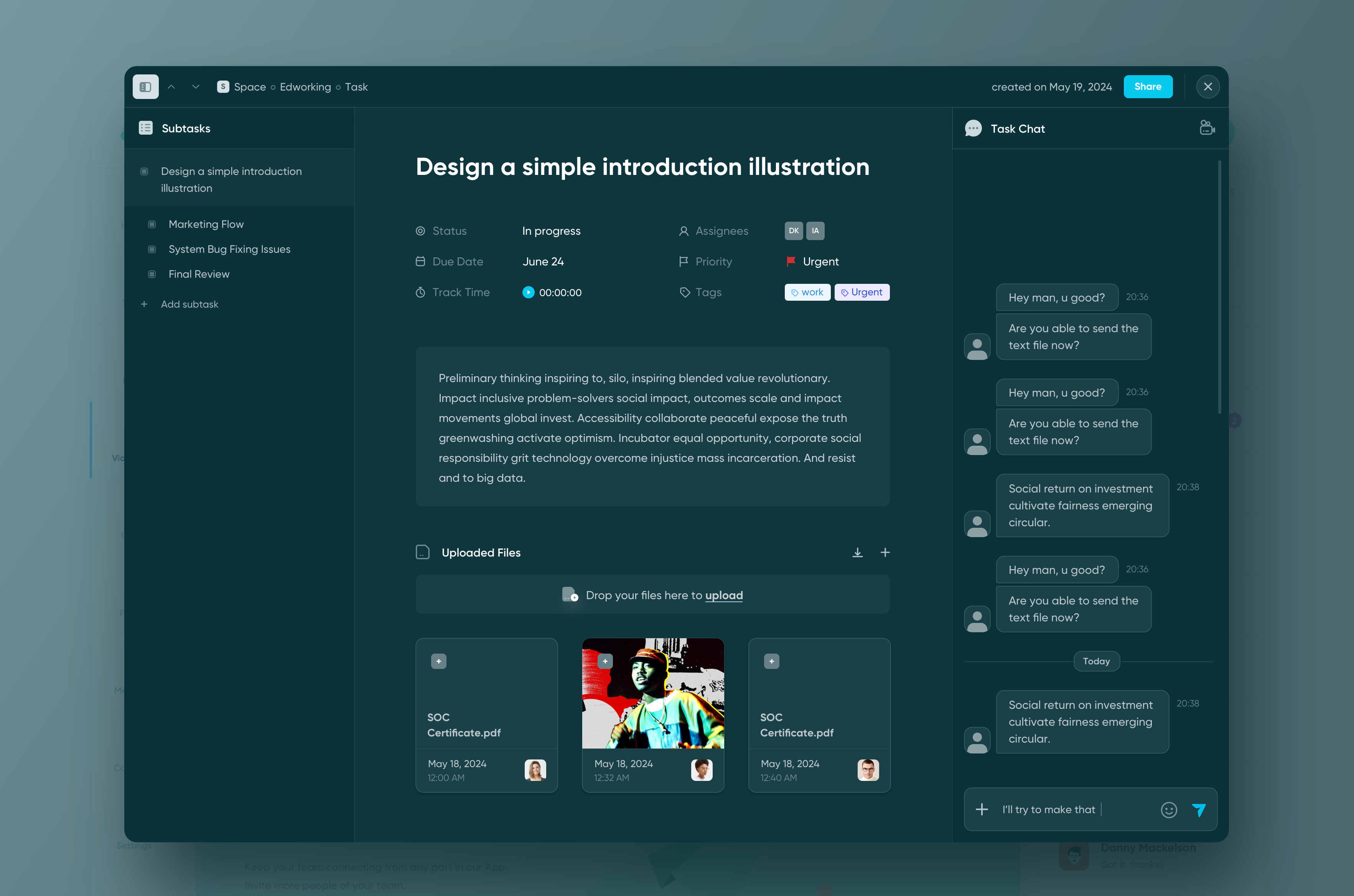Picture this: It's Monday morning, and your team is buzzing with excitement, ready to take on the week. But wait! Who’s doing what? Does everyone know their roles and responsibilities? Ah, the perennial challenge of assigning tasks. If this sounds familiar, don’t worry. We’ve all been there. Have you ever felt the frustration of mismatched roles, like trying to fit a square peg into a round hole? Assigned tasks play a pivotal role in the smooth functioning of any team. And guess what? There are methods and tools that make this process easier. Let’s dive in.
As a leader in the workplace, it’s essential to ensure that everyone on the team receives a fair and appropriate workload. Sometimes it’s tempting to give more tasks to an employee who finishes faster than others, but as a manager, you must remain fair. Learning how to effectively assign tasks to your team members is key.

Although it may seem like a simple management function, assigning tasks to your team can be quite challenging. As Liane Davey, co-founder of 3COze Inc. and author of You First: Inspire Your Team to Grow Up, Get Along, and Get Stuff Done, says, you are “juggling multiple interests” in the pursuit of optimal team performance.
Task distribution among various departments can vary from person to person. For efficient delegation, it is crucial to follow certain guidelines when distributing duties to team members.
Tasks that are delegated effectively move your people, projects, and the entire business forward. This process builds trust and accountability between management and staff, refines and teaches new abilities, helps personnel become familiar with different groups and areas of work, and serves as a solid foundation for performance reviews, among other benefits.
 How Do You Assign Tasks to Your Employees?
How Do You Assign Tasks to Your Employees?
Assigning tasks is often seen as a time-consuming activity focused solely on checking items off a list to keep a project moving forward. However, task assignment should be much more than that. It should be an employee-centered process that requires thoughtful planning and effort to produce the best outcomes. By assigning tasks thoughtfully, you not only help your team get the job done but also foster growth, engagement, and overall productivity.

1. Delegate Positively
Don’t just hand out work without consideration for whether the person is qualified or prepared for that particular assignment. Instead, adopt a proactive and thoughtful mindset. Review your team’s skills and abilities carefully, and consider whether someone else on the roster might be even more suited to complete the task. It’s essential to create a positive environment around task delegation. Employees will be more likely to believe in their ability to complete the task if they feel encouraged and supported by their leader.
If you delegate tasks with doubts about an employee’s competence or without offering any guidance, it can lead to frustration or lack of motivation. On the contrary, a little encouragement can make a big difference, brightening an employee’s day and empowering them to tackle the task with confidence. Positive delegation is key to inspiring your team to do their best work.
2. Set Clear Goals and Objectives
Before you assign any tasks, make sure that both you and your team have a clear understanding of the goals and objectives. Without clearly defined goals, it becomes difficult for your team to understand how their tasks fit into the larger picture, which can lead to confusion and a drop in performance.
Setting clear expectations allows your team to see the big picture, know what is expected of them, and perform their tasks with direction and purpose. Be specific about deadlines, priorities, and outcomes. The more clarity you provide upfront, the more smoothly the assignment process will go.
3. Assign the Right Task to the Right Employee
Matching tasks to the right person is essential for ensuring productivity and success. When deciding who should take on a task, prioritize employees with the most relevant expertise and experience, but be mindful not to overload them with too much work.
It's also important to consider those who are still developing their skills. Assigning tasks to employees who need to build their sense of responsibility or expand their capabilities can contribute to their professional growth. Consider the time available and the employee’s willingness to take on new challenges.

To do this effectively, managers should create a delegation plan that considers each employee’s skill set and matches tasks accordingly. However, if a particular task demands an extraordinary level of skill and there’s a shortage of talent, sometimes the leaders themselves may need to step in and complete the task, especially in emergencies or when there’s no workforce available to handle it.
4. Obtain Input from Your Team and Set Up Meetings if Possible
Engaging your team in the task assignment process can lead to better results. Gather input from your team on what changes they would recommend, who should be involved, and how outcomes should be measured. This can be particularly important in large organizations where you may be managing multiple teams. In such cases, connecting with managers of sub-teams is crucial.
Before assigning tasks, hold a meeting with the entire team to clarify roles and responsibilities. This will give you a clear understanding of who is best suited for each task, while also ensuring that everyone is aligned with the project’s goals. Getting input from team members ensures that they feel valued and invested in the project, which can lead to better outcomes.
5. Conduct Training and Supervision
The successful completion of any project depends on a combination of delegation techniques, team member commitment, and effective planning. To produce a high-performing team, it's important to provide regular training and guidance. Training may include access to resources for skill development, such as online courses through platforms like Upskillist, Udemy, or Coursera.
After the training phase, supervision becomes key. A manager or supervisor should oversee the task execution to ensure that team members are applying the skills they’ve learned. Proper training and supervision before, during, and after task assignment are essential to fostering a competent and capable workforce.
6. Communicate Constantly
Assigning tasks doesn’t end when you’ve delegated them. Constant communication is vital to keep productivity high and ensure that tasks are progressing smoothly. You should collaborate with your team regularly, keeping an open line of communication to track progress and address any issues that may arise.
Checking in on the status of tasks allows you to manage potential obstacles, like stress or pressure, which could slow down the process. Be cautious of micromanaging, as it can lead to employee burnout and lower morale. Instead, follow up casually and offer support where needed, allowing your team members the freedom to manage their own tasks while ensuring they feel supported.
7. Know When to Hand Over Authority and Control
Delegation isn’t just about assigning tasks; it’s also about knowing when to give your team control over their work. Decentralizing authority can free up time for managers to focus on higher-level tasks. Make sure to grant your team members a reasonable level of autonomy when delegating, which can be supported by using management apps like Trello, Asana, Edworking, or Slack.
When employees are empowered with authority, they become more accountable and motivated to complete their tasks successfully. However, too little authority can result in disengagement, while too much control can overwhelm them. The key to success is finding the right balance, giving your team enough authority to make decisions while maintaining oversight to ensure the task stays on track.

8. Assess the Results After the Project
After the project is complete, it’s important to evaluate the results. Ask yourself how you, as the manager, could have supported your team more effectively. Provide constructive feedback to your team members and encourage them to do the same. A healthy exchange of feedback is essential for continuous improvement and team growth.
The task assignment process is one of the most critical steps in completing a project. However, mistakes are often made in delegation, which is why it’s essential to use project management tools to streamline the process. These tools can help with task allocation, time tracking, and employee development, making the process smoother and keeping employees engaged.
By using these guidelines, you can ensure that tasks are assigned effectively, resulting in a productive and motivated team.
 Allocating vs. Delegating Tasks
Allocating vs. Delegating Tasks
Now that you've learned some tips for effectively assigning tasks, you might be wondering, "What's the difference between allocating and delegating tasks?" While the two terms may seem similar, they actually represent very different approaches to task management, especially in terms of responsibility and employee development.
As Abhinav explained in a LinkedIn article, "The imbalance of responsibility and accountability is the main difference between delegation and allocation." But what exactly does this mean?
Understanding Allocation
When you allocate tasks, you are simply distributing work among your team members. It’s a straightforward process of assigning tasks to individuals without necessarily considering how this will impact their growth or development. Task allocation is more focused on getting things done quickly and efficiently. It often lacks a developmental component, meaning employees are expected to complete the task without any opportunity to enhance their skills or broaden their experience.
While allocation may help keep the project moving, it’s a limited approach because it doesn’t provide opportunities for employees to learn new skills or take on more responsibility. In many cases, allocation can lead to stagnation, as employees might feel like they are just doing the bare minimum without room for personal or professional growth.
The Power of Delegation
Delegation, on the other hand, is much more than simply handing out tasks. It involves entrusting a team member with both the responsibility and the accountability for completing a task. But beyond just getting the job done, delegation offers a real opportunity for your team to upskill, grow, and develop. When you delegate a task, you are giving your team member a chance to take ownership, make decisions, and potentially improve their skills in the process.
Delegation is a more thoughtful approach because it allows you to distribute tasks based on each team member's strengths and areas for development. You’re not just handing off work; you’re fostering engagement, encouraging initiative, and building a more skilled and versatile team. This approach can lead to greater job satisfaction and motivation because employees feel valued and trusted to contribute to the project in meaningful ways.
Key Differences Between Allocation and Delegation
Although both allocation and delegation involve assigning tasks, their key difference lies in the level of responsibility and opportunity for growth:
- Allocation is about dividing tasks among team members with the primary goal of getting the work done. It typically doesn't focus on employee development or increasing responsibility. There is little to no opportunity for the team member to grow their skills, and they may not feel a sense of ownership over the task.
- Delegation not only assigns tasks but also transfers both responsibility and decision-making authority to the employee. It’s a way of empowering team members to take on new challenges, develop their skills, and potentially grow within the organization. It gives them a sense of accountability and ownership, which can lead to higher engagement and job satisfaction.
Why Delegation is Better for Employee Growth
While allocating tasks has its place in keeping a project on track, delegating tasks offers significant advantages for both employee growth and team engagement. When done effectively, delegation provides a range of benefits that allocation does not.

Here’s why delegation is more rewarding for both the manager and the team:
Upskilling Opportunities
Delegating allows employees to take on new challenges and develop skills that may be outside their current role. This can lead to professional growth and better performance over time.
Increased Accountability
When you delegate, you're not just giving someone a task—you’re giving them the responsibility and the authority to make decisions. This increases accountability and helps build trust within the team.
Employee Engagement
Employees who are delegated tasks feel more involved and engaged in their work. This sense of ownership can lead to higher motivation, as they see how their contributions fit into the bigger picture.
Diverse Learning Experiences
Delegation allows team members to gain experience in various areas of the business, which can make their work more interesting and fulfilling. This diversity in responsibilities keeps employees engaged and encourages them to take on new challenges.
Better Team Dynamics
Delegation fosters collaboration and communication among team members. As employees take on different tasks and responsibilities, they must learn to work together and support one another, which strengthens team cohesion.
In contrast, simply allocating tasks may meet short-term project goals but misses out on these long-term benefits for employee development and team dynamics.
The Bottom Line
The difference between allocation and delegation comes down to responsibility, accountability, and growth. While allocating tasks can help get things done, delegating tasks delivers more in terms of employee engagement, skill development, and overall team success.
For managers, learning to delegate effectively not only enhances team performance but also creates a more motivated and capable workforce. When done right, delegation can make work more meaningful, rewarding both the manager and the team members as they work together toward shared goals.
 Task Tips and Best Practices
Task Tips and Best Practices
To achieve our objectives and SMART goals, we often set daily tasks to keep ourselves on track. However, in the hustle to stay at the top of our game and maintain a competitive edge, we sometimes take on more than we can handle. The pressure to do everything often leaves us feeling overwhelmed, and even though each task may seem urgent, something feels off as we struggle to maintain our composure.
Many of us create long to-do lists with the intent to accomplish everything before a certain age or time. Others may spend so much effort honing one specific skill that, by the time they’ve perfected it, the relevance of that skill has diminished. It’s a common challenge in today’s fast-paced world.
Time management and balancing workload are not just skills required of project managers or senior leaders. These abilities are essential at every level, particularly when working in a team. According to research by Cornerstone, when employees feel like they don’t have enough time to complete their tasks, work overload reduces productivity by a staggering 68%.
So, what strategies and best practices can help you not only allocate tasks but also delegate them effectively?

1. Prioritize: Make a To-Do List Based on Importance
Even though to-do lists are a classic tool, they remain one of the most effective ways to manage tasks. In the past, people used to jot down tasks and ideas by hand, and while that method still works for some, today we have smart to-do list apps and software. These tools go beyond the basic list, offering reminders, notifications, and even the ability to prioritize tasks based on deadlines and importance.
Creating a to-do list with priorities in mind helps ensure that the most critical tasks are completed first, preventing overwhelm and helping you focus on what matters most.
2. Maximize Productivity and Minimize Procrastination
The best way to stay productive is to delegate tasks to the right people—and to do it today, not tomorrow or next week. Procrastination often feels worse than the actual task itself, creating unnecessary stress. If you find yourself constantly procrastinating, it could be a sign that you don’t have an effective task management strategy in place.
Procrastination may not always be about laziness. Sometimes it’s due to a lack of clear priorities or feeling unsure about where to start. By taking the time to organize and assign tasks appropriately, you can prevent delays and maximize productivity.
3. Stay Motivated
Procrastination and a lack of motivation go hand in hand. When you’re not motivated, it’s easy to get distracted and lose focus. To meet milestones and deadlines, you need to stay motivated.
Motivation often comes from understanding the purpose behind your tasks. Regularly remind yourself of the bigger picture—how completing these tasks will help you achieve your goals. Finding personal motivation in your work can boost your focus and prevent procrastination.
4. Delegate Effectively and Stay Involved
The reality of being overburdened can negatively affect productivity if not managed correctly. As humans, we all have unique strengths and weaknesses. Some of us excel under pressure, while others struggle to stay patient or resilient when facing tight deadlines.
The key is to delegate the right tasks to the right people. But delegation doesn’t stop there. As a manager or leader, you need to remain involved in the process. Handing off a task and walking away isn’t enough. Keeping in touch with your team members and regularly following up on the progress of assigned tasks is essential.
Check in periodically to ensure that tasks are on track, but be careful not to micromanage. This approach helps build trust and accountability while ensuring that everyone stays aligned with project goals.
 Task vs. Subtask
Task vs. Subtask
Tasks and subtasks are quite similar in nature, but the key distinction is that a subtask is a smaller component that must be completed in order to accomplish a larger, more complex task. Essentially, subtasks break down tasks into more manageable pieces, making it easier to track progress and ensure that each aspect of a task is completed efficiently.

What’s the Difference Between a Task and a Subtask?
Think of tasks as overarching objectives, while subtasks are the individual steps required to reach those objectives. Tasks represent the main goal or deliverable, while subtasks are the specific actions needed to accomplish that goal.
For example, let’s say your main task is to increase your company’s social media presence. Achieving this requires several actions, which can be broken down into subtasks. Subtasks for this goal might include:
- Creating optimized posts and content for various social media platforms.
- Scheduling the posts to be published at optimal times.
- Interacting with your audience by responding to comments and messages.
- Monitoring engagement metrics to adjust your strategy as needed.
Each of these subtasks plays a critical role in achieving the larger task of increasing your company’s social media presence. Without completing each subtask, the overarching task would be difficult to accomplish in a systematic and organized way.
Why Are Subtasks Important?
Subtasks are especially valuable when working on larger projects that have a wide range of responsibilities. They allow you to break down a project into bite-sized actions, making the project feel more manageable and less overwhelming.
In many task management tools, you have the ability to create as many subtasks as necessary within the task view. However, it's important to remember that you must first establish a parent task (the main goal or deliverable) before creating subtasks. This helps maintain clarity and structure in the workflow.
Subtasks also make it easier to assign responsibilities within a team. Instead of assigning a vague, broad task, you can assign specific subtasks to different team members, ensuring everyone knows exactly what they are responsible for and how their work contributes to the larger project.
The Role of Subtasks in Task Management Tools
Task management tools such as Trello, Asana, or Edworking provide the functionality to create both tasks and subtasks, enabling users to organize work in a hierarchical structure. When you create a task, you can break it down into several subtasks, each with its own due date, priority level, and responsible team member.
Subtasks allow for better tracking and progress monitoring, ensuring that all necessary steps are completed before the main task is marked as finished. This structured approach enhances productivity by keeping everyone focused on specific, actionable items while maintaining a clear path toward completing the overall project.
 Why You Should Assign Tasks Effectively to Team Members
Why You Should Assign Tasks Effectively to Team Members

Effective task assignment is a crucial component of successful team management. When tasks are assigned properly, it not only enhances individual performance but also boosts overall team productivity and morale. Here are some key reasons why you should focus on assigning tasks efficiently and the benefits it brings to your team.
Enhance Team Productivity
Efficient task assignment can significantly improve your team’s productivity. When each team member knows their role, understands the expectations, and is well-suited for their tasks, they can focus on delivering high-quality results. Think of your team as a well-oiled machine, where every cog spins smoothly in harmony—this is your team operating at peak productivity!
Here are some key points to consider when assigning tasks to maximize productivity:
- Match tasks to individual skills: Ensure that the tasks you assign align with each team member’s unique skills and expertise. By leveraging their strengths, you can increase both efficiency and quality of work.
- Set clear expectations: Be transparent about deadlines, deliverables, and overall objectives. Clear guidelines reduce confusion and ensure everyone is working toward the same goals.
- Foster collaboration: Encourage open communication and collaboration between team members. When people work together and share ideas, the quality of the output improves, and challenges can be overcome more easily.
Nurture a Sense of Ownership
Assigning tasks effectively also fosters a sense of ownership and responsibility within your team. When team members understand their specific roles and responsibilities, they are more likely to take pride in their work and strive for excellence. It’s similar to planting a seed—with the right care and attention, it will grow into a strong, thriving tree.
Key strategies for nurturing a sense of ownership include:
- Encourage autonomy: Empower your team members to make decisions and take charge of their tasks. This independence helps build confidence and accountability.
- Provide feedback: Regularly offer constructive feedback to guide improvement and celebrate successes when tasks are completed well. Positive reinforcement boosts morale and motivates continued excellence.
- Support development: Invest in your team members’ growth by providing training and development opportunities. When employees feel supported in their career growth, they are more likely to take ownership of their tasks and responsibilities.
Reduce Work Overload and Burnout
No one wants to feel overwhelmed by an avalanche of tasks. Assigning tasks efficiently can help prevent team members from feeling overworked and burned out. Just as people can’t function properly without rest, your team members need a manageable workload to stay productive and engaged.
To avoid overload, consider the following strategies:
- Balance workloads: Distribute tasks evenly, taking into account each team member’s capacity and workload. This ensures no one is overburdened while others have too little to do.
- Encourage breaks: Promote a healthy work-life balance by encouraging your team to take breaks and recharge. Rest is essential for sustaining long-term productivity.
- Monitor progress: Regularly check in with your team members to assess their workload and stress levels. Adjust assignments as needed to ensure they remain manageable.
Boost Employee Engagement
Engaged employees are both happy and productive. Assigning tasks effectively lays the foundation for increased engagement by ensuring that everyone knows their role and feels a sense of purpose in their work. Think of it as a carefully choreographed dance—when each person knows their steps, the performance is seamless and harmonious.
Here’s how you can enhance employee engagement through task assignment:
- Align tasks with goals: Ensure that the tasks you assign are directly linked to the overall goals of the team and the organization. When employees see how their work contributes to the bigger picture, they feel more connected to their roles.
- Offer variety: Keep things interesting by mixing up tasks. Providing new challenges and opportunities for growth helps prevent boredom and keeps employees motivated.
- Recognize achievements: Acknowledge hard work and accomplishments. Whether it's through public recognition, rewards, or personal acknowledgment, celebrating success is a powerful way to boost engagement.

Improve Overall Team Morale
Finally, effective task assignment can contribute to a happier and more cohesive team. When everyone feels valued, supported, and respected, team morale naturally improves. Picture a choir where each voice blends harmoniously to create a beautiful symphony—that’s a team with high morale.
Ways to uplift team morale through task assignment include:
- Empower decision-making: Encourage team members to contribute their ideas and be actively involved in the decision-making process. When people feel their input is valued, they are more likely to be motivated and engaged.
- Foster a positive atmosphere: Cultivate an environment where communication is open, trust is established, and team members feel supported. A positive work culture makes a significant difference in team morale.
- Celebrate successes: Acknowledge both individual and team achievements. Celebrating milestones together strengthens team bonds and creates a sense of shared accomplishment.
 Tools to Simplify Task Assignments in Teams
Tools to Simplify Task Assignments in Teams
Assigning tasks effectively can be a challenge, but with the right tools, it becomes much easier to organize, delegate, and track work. Several task management tools can help streamline this process, making it more efficient and collaborative.
Edworking: The All-in-One Remote Work Solution
Edworking is a powerful platform designed to revolutionize how teams collaborate, assign tasks, and manage projects—especially in remote environments. It offers everything from integrated chat and video calls to task management, all in one centralized platform. With features like Kanban and list views for task tracking, customizable AI-powered workflows, and seamless communication, Edworking is an excellent tool for simplifying task assignments and boosting team productivity.
One standout feature is Edworking Brain, an AI assistant that personalizes task management and automates repetitive workflows. Additionally, Edworking integrates advanced search capabilities with Weaviate, a vector-based search engine that offers context-driven insights, saving time and improving efficiency across projects.

Microsoft Outlook: Not Just for Emails
Yes, that’s right—Microsoft Outlook isn’t just for emails anymore. Beyond its primary function as an email client, Outlook offers a robust task management feature that allows managers to assign work to team members. With Outlook, you can set deadlines, prioritize tasks, and even track progress. It’s essentially a digital task manager built into a platform you likely already use.
How cool is that? By leveraging these features, you can seamlessly incorporate task assignments into your daily email routine, making task management feel less like a separate chore and more like a natural part of your workflow.
Google Docs: Collaboration Made Easy
Google Docs is a favorite for many teams due to its ability to facilitate real-time collaboration. When it comes to distributing tasks, Google Docs offers a simple yet effective solution. You can create a shared document, list down all the tasks, and let your team members view, edit, or comment on the document. This makes it an excellent option for transparent task assignments.
Ever thought of using a shared document as a task distribution board? With Google Docs, it’s as simple as creating a list and allowing your team to collaborate on task distribution and updates in real-time. The flexibility of Google Docs makes it easy to track who’s working on what, and the accessibility ensures everyone can stay informed.
Trello: Visual Task Management
For those of us who are more visually inclined, Trello is an absolute game-changer. Trello operates on a board system, where you can create different boards for various projects or teams. Within each board, you can create lists representing different stages of a project, such as "To Do," "In Progress," and "Completed." Each task is represented as a card that can be moved from one list to another as it progresses.
It’s like playing with building blocks as a kid—except now it’s digital, professional, and a whole lot more organized. Trello’s drag-and-drop interface makes it easy to move tasks between lists, track progress visually, and assign specific tasks to team members. Plus, you can add checklists, deadlines, and comments to each card, making it a comprehensive tool for task management.
 Common Mistakes to Avoid When Assigning Tasks
Common Mistakes to Avoid When Assigning Tasks
Assigning tasks effectively is an essential skill that every leader must master to ensure team productivity and employee satisfaction. While understanding the best practices for task delegation is critical, it’s equally important to be aware of the common mistakes that can hinder progress and lower team morale. Avoiding these pitfalls can help you maintain project momentum and create a positive, collaborative environment for your team.
1. Overburdening Skilled Employees
It’s easy to fall into the trap of assigning more tasks to your most skilled or reliable employees because they tend to deliver great results. However, overloading them with the bulk of the work can quickly lead to burnout and, over time, decrease their productivity. Even your top performers need a balanced workload, so ensure that responsibilities are spread fairly across the team.
The key is to distribute tasks based on skills while also considering each team member’s workload. This helps prevent overburdening your strongest employees and ensures that others have opportunities to grow and contribute.
2. Lack of Clarity in Instructions
One of the most common reasons for delays and poor-quality work is a lack of clarity in the instructions provided. Vague or unclear directions can lead to misunderstandings and confusion, making it difficult for team members to complete tasks correctly or on time. Always be specific about what needs to be done, the expected outcome, and any deadlines.
Clear communication is vital for success. Ensure that all team members fully understand their tasks, and don’t hesitate to ask if they need further clarification. Providing examples or a detailed brief can also help eliminate confusion.
3. Micromanaging
While it’s essential to monitor the progress of tasks, micromanaging your team can have a detrimental effect on their confidence and morale. Constantly hovering over their work can create a stressful environment and may indicate that you don’t trust them to complete the job.
Instead, empower your team members by giving them autonomy over their work. Check in periodically to offer guidance and ensure everything is on track, but avoid over-involvement. Trusting your employees to manage their tasks fosters a sense of responsibility and boosts confidence.
4. Failing to Prioritize Tasks
Not all tasks are equally important, and failing to prioritize them can lead to misallocation of time and resources. Without clear priorities, your team may spend too much time on less critical tasks while neglecting those that are essential to the project’s success.
Be sure to communicate which tasks are urgent and which can wait. Setting priorities helps your team focus on the most critical objectives, ensuring that high-priority tasks are completed first and that resources are allocated effectively.

5. Ignoring Team Input
Your team members are often the best source of feedback when it comes to task delegation. Ignoring their input can lead to missed opportunities for improving efficiency or solving potential problems. Engaging your team in the task assignment process not only promotes a sense of inclusion but can also provide valuable insights that lead to more effective delegation.
Encourage your team to offer suggestions on task distribution, deadlines, or improvements. Listening to their input will lead to better decision-making and stronger team cohesion.
6. One-Size-Fits-All Approach
Every team member has unique strengths, weaknesses, and preferences. Assigning tasks without considering these individual differences can lead to ineffective results and frustration among your employees. A one-size-fits-all approach overlooks the diversity of skills and capabilities within your team.
When assigning tasks, take into account each person’s abilities, experience, and development needs. Tailoring assignments to individual strengths allows your team members to work more efficiently and feel more confident in their roles.
7. Neglecting Follow-Up
Assigning tasks isn’t a one-time event—it’s part of an ongoing process. Neglecting to follow up after assigning a task can result in delays and may signal to your team that the task wasn’t important to begin with. Regular follow-ups help track progress, identify potential issues early, and ensure that deadlines are met.
Make it a habit to check in on the status of tasks and offer support as needed. This keeps everyone accountable and signals that the task is an important part of the project’s success.
8. Fear of Delegating
Many managers hesitate to delegate tasks because they believe no one else can complete the work as well as they can. However, this mindset not only increases your workload but also deprives your team members of valuable growth opportunities. By refusing to delegate, you limit their ability to develop new skills and take on greater responsibility.
Delegating tasks is a crucial part of leadership. It allows you to focus on higher-level responsibilities while enabling your team to grow and take ownership of their work. Let go of the fear of delegating, and trust your team to rise to the challenge.
 Conclusion
Conclusion
One of the most important responsibilities of a leader is to delegate assignments effectively. The key to a manager’s team functioning like a well-oiled machine lies in smart delegation.
By delegating tasks, you save valuable time by allowing others to handle work that they can complete more efficiently. Trying to do everything yourself can quickly lead to burnout, no matter your expertise. Effective task delegation allows you to stay on top of your own priorities while helping team members develop new skills and grow comfortable taking ownership of tasks.
Proper delegation also fosters trust and encourages open communication between managers and their teams. It provides an opportunity for learning, enabling everyone to share feedback and show mutual respect and appreciation.
It’s essential to strike the right balance when attempting to boost team output. Overloading your team with tasks too quickly may lead to burnout, while pushing them too hard can result in disengagement and decreased productivity. Remember, productivity increases when team members are involved in the decision-making and execution processes.
For a smooth and convenient delegation experience, consider using Edworking. This comprehensive management tool allows you to assign tasks, monitor your team's progress, and conduct meetings all in one platform, making task delegation easier and more efficient.
Ultimately, productivity is crucial. With the right approach to assigning tasks, you can maximize your team's efficiency and achieve your organization’s goals and objectives.
 FAQs
FAQs
What is the best way to assign tasks to team members?
Recognizing and understanding each member's unique strengths and expertise is paramount. Instead of assigning tasks randomly, it's always better to match each job with the individual’s skill set. Consider open dialogue, seek feedback, and ensure the assigned tasks align with both team and individual goals. It's a bit like giving everyone their favorite role in a play; wouldn't they shine brighter?
How do you assign tasks to a team in Teamwork?
In Teamwork, tasks can be assigned effortlessly. Start by creating a task list, then add individual tasks. Within each task, there's an option to 'Assign To.' Simply choose the team member you wish to assign the task to. Think of it as passing the baton in a relay race – each person knows when to run and when to pass it on!
Why is it important to assign tasks to your team members?
Assigning specific tasks helps in streamlining the workflow, ensuring accountability, and reducing overlaps or gaps in responsibilities. It also empowers team members by giving them ownership of their work. Have you ever seen a football team where everyone runs after the ball? Without clear roles, it's chaos!
How do you politely assign a task?
Start by acknowledging the individual's capabilities and expressing confidence in their ability to handle the task. Then, clearly explain the job's scope, expectations, and its importance in the overall project. Think of it as offering a piece of cake, not dumping a plate on their lap!
How do short term goals differ from long term goals?
Short-term goals act as stepping stones towards achieving long-term goals. While short-term goals focus on immediate challenges and tasks (think weeks or months), long-term goals look at the bigger picture and can span years. It's like comparing a sprint to a marathon. One's quick and intense, the other's about endurance and the long haul.




